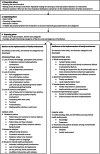Barriers and facilitators when implementing family involvement for persons with psychotic disorders in community mental health centres - a nested qualitative study
- PMID: 36096844
- PMCID: PMC9469513
- DOI: 10.1186/s12913-022-08489-y
Barriers and facilitators when implementing family involvement for persons with psychotic disorders in community mental health centres - a nested qualitative study
Abstract
Background: The uptake of family involvement in health care services for patients with psychotic disorders is poor, despite a clear evidence base, socio-economic and moral justifications, policy, and guideline recommendations. To respond to this knowledge-practice gap, we established the cluster randomised controlled trial: Implementation of guidelines on Family Involvement for persons with Psychotic disorders in community mental health centres (IFIP). Nested in the IFIP trial, this sub-study aims to explore what organisational and clinical barriers and facilitators local implementation teams and clinicians experience when implementing family involvement in mental health care for persons with psychotic disorders.
Methods: We performed 21 semi-structured focus groups, including 75 participants in total. Implementation team members were interviewed at the initial and middle phases of the intervention period, while clinicians who were not in the implementation team were interviewed in the late phase. A purposive sampling approach was used to recruit participants with various engagement in the implementation process. Data were analysed using manifest content analysis.
Results: Organisational barriers to involvement included: 1) Lack of shared knowledge, perceptions, and practice 2) Lack of routines 3) Lack of resources and logistics. Clinical barriers included: 4) Patient-related factors 5) Relative-related factors 6) Provider-related factors. Organisational facilitators for involvement included: 1) Whole-ward approach 2) Appointed and dedicated roles 3) Standardisation and routines. Clinical facilitators included: 4) External implementation support 5) Understanding, skills, and self-efficacy among mental health professionals 6) Awareness and attitudes among mental health professionals.
Conclusions: Implementing family involvement in health care services for persons with psychotic disorders is possible through a whole-ward and multi-level approach, ensured by organisational- and leadership commitment. Providing training in family psychoeducation to all staff, establishing routines to offer a basic level of family involvement to all patients, and ensuring that clinicians get experience with family involvement, reduce or dissolve core barriers. Having access to external implementation support appears decisive to initiate, promote and evaluate implementation. Our findings also point to future policy, practice and implementation developments to offer adequate treatment and support to all patients with severe mental illness and their families.
Trial registration: ClinicalTrials.gov Identifier NCT03869177. Registered 11.03.19.
Keywords: Barriers; Facilitators; Family interventions; Family involvement; Family psychoeducation; Implementation; Mental health services research; Psychotic disorders.
© 2022. The Author(s).
Conflict of interest statement
The authors declare that they have no competing interests.
Figures
References
-
- Bucci S, Berry K, Barrowclough C, Haddock G. Family interventions in psychosis: a review of the evidence and barriers to implementation. Aust Psychol. 2016;51(1):62–68. doi: 10.1111/ap.12172. - DOI
-
- Bighelli I, Rodolico A, García-Mieres H, Pitschel-Walz G, Hansen W-P, Schneider-Thoma J, et al. Psychosocial and psychological interventions for relapse prevention in schizophrenia: a systematic review and network meta-analysis. Lancet Psychiatry. 2021;8(11):969–80. doi: 10.1016/S2215-0366(21)00243-1. - DOI - PubMed
Publication types
MeSH terms
Associated data
Grants and funding
LinkOut - more resources
Full Text Sources
Medical
Miscellaneous


